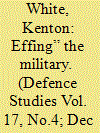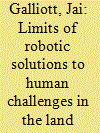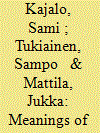|
|
|
Sort Order |
|
|
|
Items / Page
|
|
|
|
|
|
|
| Srl | Item |
| 1 |
ID:
155766


|
|
|
|
|
| Summary/Abstract |
The use of commercial business management techniques is widespread in all government departments, including the Ministry of Defence. This article examines the use of popular management techniques in the Armed Forces and argues that their application is misplaced. It looks at what the “effs” – “efficiency” and “effectiveness” – mean in the business world and to the Armed Forces. It compares the definitions both in business and the Armed Forces and finds that there are few, if any, situations where the same measurements can be applied. Whilst many management techniques are suited for business, the function of the Armed Forces and its output cannot be measured in the same way, complicated by the different metrics of “efficiency” in peace and in war. This difference may not be clearly understood by some politicians, or indeed by some senior military personnel. Using examples from some of the most popular management techniques such as “Lean” and “Agile” it is possible to see that their use might actually diminish the capabilities of the Armed Forces when it comes to performing their principal role – the use of force to achieve political objectives.
|
|
|
|
|
|
|
|
|
|
|
|
|
|
|
|
| 2 |
ID:
155765


|
|
|
|
|
| Summary/Abstract |
In the face of rapid technological change and the creation of ambitious military modernisation programmes, this paper argues that land forces, in managing the relationship between force levels and the adoption of military robotics, must recognise that there are inherent limits to techno-centric force reduction efforts and realise the inefficacy of substituting skilled soldiers with robots. It begins with an overview of how the proper integration of robotics into a military’s force structure can improve capability, save lives and potentially reduce costs, but suggests that common accounts of robot utility are exaggerated and endanger the risk assessment processes governing the adoption of said technologies and relevant personnel settings. The paper explores the limits of robotic solutions to military problems, discussing their technical limitations, redundancy and related issues that, when combined with a technico-moral skills degradation problem also detailed within, point to the need to reshape force structures to suit the adoption of robotics while preserving existing levels of human staffing.
|
|
|
|
|
|
|
|
|
|
|
|
|
|
|
|
| 3 |
ID:
155767


|
|
|
|
|
| Summary/Abstract |
This paper studies what kinds of meanings reserve officers ascribe to military ranks. The study builds on existing literature on reserve forces and hypothesizes that military ranks among reserve officers are subject to rendering the ranks with multiple meanings, and which are bound to create ambiguity of interpretation. To elaborate these theoretical insights a survey among Finnish reserve officers was conducted (N = 6193). The data was analyzed using factor analysis and correlation analysis. The results show that military ranks are ascribed, in addition to the functionalistic, hierarchical meaning, also with meanings of prestige, proficiency, and identity. The main theoretical contribution of the paper is in complementing the previous literature on ambiguity of military ranks by specifying four different meanings in the interpretation of the ranks.
|
|
|
|
|
|
|
|
|
|
|
|
|
|
|
|
| 4 |
ID:
155768


|
|
|
|
|
| Summary/Abstract |
Multinational Military Exercises (MMEs) are often viewed by states as opportunities to increase interoperability, improve cooperation, and solve common security problems. We argue that in addition to this, MMEs work as tools to shape the shared beliefs of coalition partners surrounding threat. Specifically, MMEs allow multinational forces to identify best practices, consolidate beliefs, and codify behavior through doctrine, typically by means of some institutional process. We examine our argument on MMEs through an analysis of various multinational and coalition partner efforts to identify security threats and cooperate through the development of common doctrine at the strategic, operational, and tactical levels of warfare. Our analysis suggests that the use of MMEs for doctrine development does help to socialize states in terms of identifying common threats and subsequently sharing a process by which to address them.
|
|
|
|
|
|
|
|
|
|
|
|
|
|
|
|
|
|
|
|
|